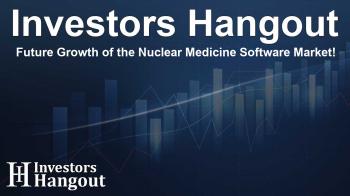Future Growth of the Nuclear Medicine Software Market!

Expanding Horizons of Nuclear Medicine Software Market
As we look forward to the advancements in the medical field, the nuclear medicine software market is creating waves with its potential for remarkable growth. The trend is compelling, especially with the increasing adoption of advanced technologies such as artificial intelligence and machine learning. These advancements are designated to enhance accuracy in imaging and make diagnostics significantly more effective.
Market Forecast and Key Trends
Current estimates suggest that the global nuclear medicine software market could see a pronounced increase in value, projected to grow from USD 980.5 million to around USD 1.8 billion by the end of the forecast period. This remarkable growth, quantified as a compound annual growth rate (CAGR) of 9.1%, is attributed significantly to the rising incidence of chronic conditions, including cancers and cardiovascular diseases, that necessitate accurate diagnostics.
Growing Demand for Diagnostics
The urgent need for dependable diagnostic solutions is accelerating the nuclear medicine software market. With the ongoing rise in chronic disease cases, healthcare providers are vying for effective tools to manage patient data and enhance clinical decision-making. Notably, the oncology sector alone is anticipated to claim a substantial share of the market as the leading therapeutic area.
Challenges in the Pathway
Though the outlook appears optimistic, there are hurdles to overcome. One of the most significant challenges is the high implementation costs related to advanced nuclear medicine software. This financial burden often restricts smaller healthcare facilities, particularly in underserved areas, from upgrading to more effective diagnostic systems.
Technology at the Forefront
On the brighter side, escalating technological innovations are paving new paths for market sustenance. Advancements in imaging technologies like Positron Emission Tomography (PET) are significantly improving diagnostic capabilities, necessitating advanced software for image processing. This innovation not only aids in delivering precise treatment plans but also serves as a catalyst for nuclear medicine software providers.
The Rise of AI in Nuclear Medicine
Artificial intelligence is emerging as a powerful ally in the nuclear medicine software landscape. By enhancing image reconstruction and automating data analysis, AI brings about a shift in how healthcare professionals interpret diagnostics. More healthcare facilities are gaining access to AI-enhanced software, which improves workflows and ultimately leads to better patient outcomes.
Current Market Dynamics
Various current market dynamics greatly influence the trajectory of nuclear medicine software. For instance, regulatory bodies have recently approved a considerable number of AI/ML-based medical devices, which in turn accelerates the adoption of artificial intelligence within nuclear medicine software, thereby enhancing efficiency and diagnostic accuracy.
Emerging Trends in the Nuclear Medicine Software Market
A notable shift towards personalized medicine is reshaping the landscape. Customized treatments are now more in focus, and nuclear medicine software plays a pivotal role in this transformation, significantly improving treatment effectiveness and patient satisfaction. Additionally, the growing popularity of cloud-based solutions due to their affordability and ease of integration is expected to drive market expansion.
Competitor Landscape and Innovations
Within this vibrant market, key players like GE HealthCare and Philips Healthcare are making strides. Recent product launches indicate a commitment to improving efficiency, precision, and communication within healthcare settings. This includes the adaptation of technologies to streamline manual processes and enhance overall patient care.
Looking Ahead
The future of the nuclear medicine software market is filled with promise as the industry adapts to meet the needs of an evolving healthcare landscape. A range of developments, from the integration of new imaging technologies to enhanced software capabilities, indicates that we are on the brink of a new era in nuclear medicine.
Frequently Asked Questions
1. What is the projected growth of the nuclear medicine software market?
The market is expected to grow from USD 980.5 million to approximately USD 1.8 billion by the end of the forecast period, representing a CAGR of 9.1%.
2. What challenges is the nuclear medicine software market facing?
The high costs associated with implementing nuclear medicine software pose significant challenges for smaller healthcare facilities.
3. How is AI impacting the nuclear medicine software market?
AI enhances diagnostic accuracy, streamlines workflows, and supports faster detection of diseases, driving more healthcare providers to use AI-based solutions.
4. What are the key trends shaping the nuclear medicine software market?
Key trends include the shift towards personalized medicine, increasing cloud-based software adoption, and innovative imaging technologies.
5. Who are the major players in the nuclear medicine software market?
Key players include GE HealthCare, Siemens Healthineers, and Philips Healthcare, among others, leading the innovation within the market.
About The Author
Contact Kelly Martin privately here. Or send an email with ATTN: Kelly Martin as the subject to contact@investorshangout.com.
About Investors Hangout
Investors Hangout is a leading online stock forum for financial discussion and learning, offering a wide range of free tools and resources. It draws in traders of all levels, who exchange market knowledge, investigate trading tactics, and keep an eye on industry developments in real time. Featuring financial articles, stock message boards, quotes, charts, company profiles, and live news updates. Through cooperative learning and a wealth of informational resources, it helps users from novices creating their first portfolios to experts honing their techniques. Join Investors Hangout today: https://investorshangout.com/
The content of this article is based on factual, publicly available information and does not represent legal, financial, or investment advice. Investors Hangout does not offer financial advice, and the author is not a licensed financial advisor. Consult a qualified advisor before making any financial or investment decisions based on this article. This article should not be considered advice to purchase, sell, or hold any securities or other investments. If any of the material provided here is inaccurate, please contact us for corrections.

